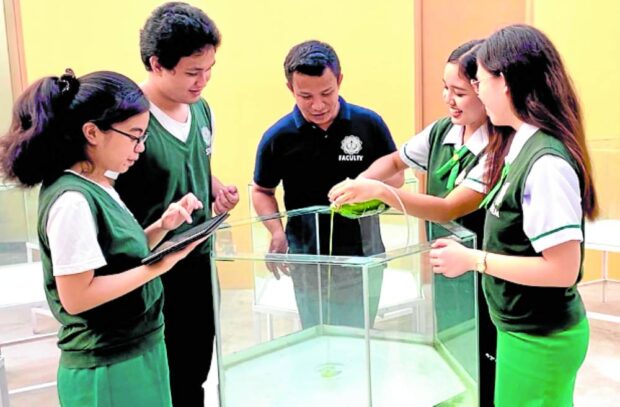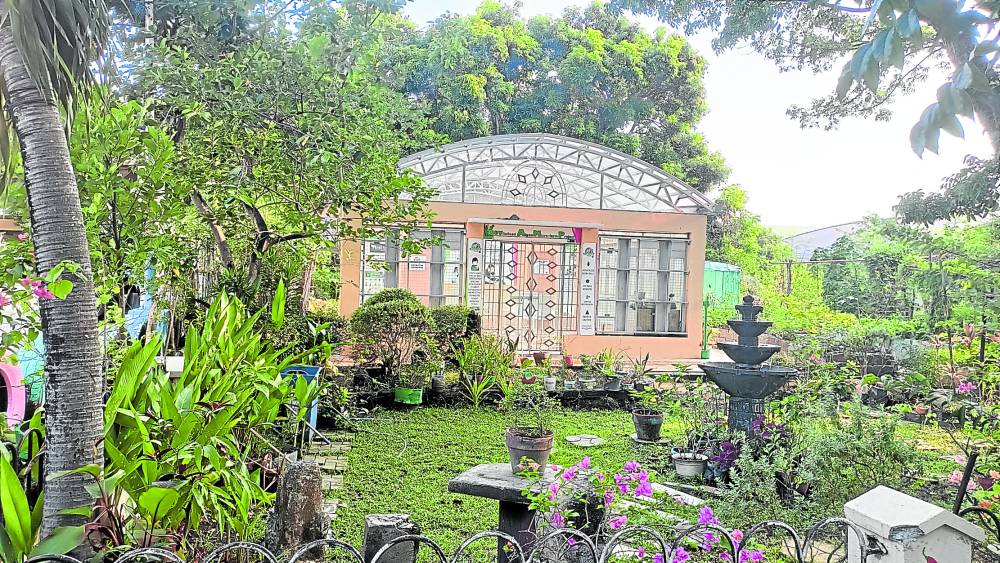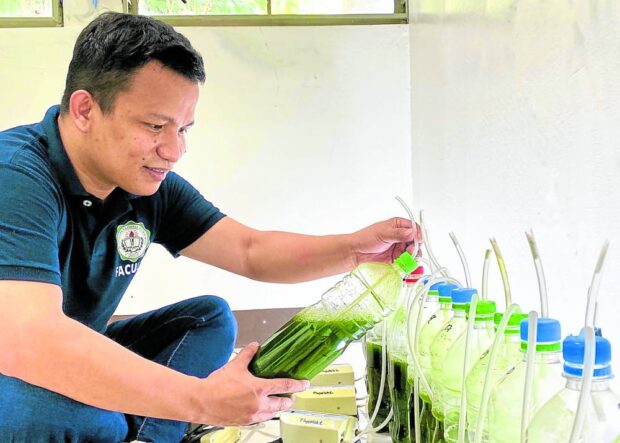Biotech solution: High school’s algae farm aims to curb pollution

HANDS ON Jason Albaro (center) and Muntinlupa National High School (MNHS) students cultivate microalgae to fight climate change. —photos from JASON ALBARO
Muntinlupa National High School (MNHS), the oldest and biggest school in Muntinlupa, is banking on biotechnology to shape the next generation of Filipinos and help save the planet.
Located at the New Bilibid Prison reservation in Barangay Poblacion, MNHS conceptualized Revitalized Algae Microfarm Project (RevAMP) in 2017, the first of its kind in the Philippines. It harnesses the potential of microalgae not only to address pollution but also to enhance the quality of education.
“Our primary goal in the implementation of RevAMP is really to capture the environmental protection aspect initially,” Jason Albaro, overall project director of RevAMP, says in a Zoom interview with Inquirer.
Just like most public schools in the metropolis, MNHS had inadequate ventilation systems. Poor air quality made students’ learning environment less conducive, resulting in declining performance of both teachers and students.
Wanting to deal with pollution problems, MNHS hatched RevAMP (formerly known as Comprehensive Algae Microfarm Project) to cultivate chlorella vulgaris algae, best known for the ability to absorb greenhouse gases and pollutants. Their absorption capacity ranges between 17,000 and 18,000 tons of carbon dioxide per acre a year. Simply put, they remove harmful elements in the air we breathe.
Article continues after this advertisementAlbaro, also the head teacher of MNHS science department, describes RevAMP as an experiential farm that allows learners to perform different activities related to science and technology. That way, it increases the ability of learners to contribute to research and development while enhancing their creativity.
Article continues after this advertisement“We are doing research here in terms of science investigatory projects and robotics related to that. With RevAMP, students are able to do things, experiment with things, invent things because of the inspiration and the different methodologies that we are teaching,” he says.

MICROFARM The facility inside the New Bilibid Prison where MNHS cultivates greenhouse gas-absorbing algae.
Better air quality
Now in its sixth year, RevAMP is focusing on improving air quality as Metro Manila is grappling with pollution problems.
“Since we are facing climate change and other problems related to the environment, we would like to find ways in order for us to be beneficial in the future and to promote sustainability in terms of education,” he adds.
Prior to its implementation, it was observed that majority of schools in urban areas suffered from poor air quality. Today, results prove that areas covered by the project have good air quality.
MNHS is implementing the project in schools close to the South Luzon Expressway or those located near dumpsites or creeks. Albaro says the target is to replicate RevAMP in 28 schools in Muntinlupa within this year and eventually, across the region.
Just like any other project, any initiative aimed at reducing air pollution has its own challenges and RevAMP is no exception. Albaro says they are dealing with “a mountain of problems and challenges” in carrying out this initiative, such as lack of funding, change in the MNHS administration every three years and the typhoons that hit the archipelago every year.
“Since our location is within the national penitentiary, there is a security measure that they are applying, which hinders us from doing improvements on the project,” Albaro says, citing the need to request for clearance to bring in every material that they need. “There are a lot of processes that we need to undergo and also, our students are having difficulty in entering the premises. We are having the problems addressed one by one,” he says.
To address these, the school is linking up with other institutions with similar goals to sustain the project. It has partnered with the Department of Education and the Department of Science and Technology to improve RevAMP’s current setup. It also teamed up with the University of the Philippines for the culture and testing of algae.
“As of this time, we have already established the initial partnership and memorandum of agreement so that we can foster direct connections with these agencies,” Albaro says.

BOTTLED ALGAE Albaro inspecting MNHS’ green micro warriors
International recognition
Amid these setbacks, the school caught the attention of international institutions for its efforts to protect the environment. In 2019, MNHS was one of the 10 recipients of the Zayed Sustainability Prize, which recognizes small to medium-sized enterprises, nonprofit organizations and high schools with impactful, innovative and inspiring sustainable solutions.
Just recently, London-based global education platfotm T4 Education picked MNHS’ RevAMP as one of the three finalists for its “World’s Best School” prizes for environmental action, along with Colombia’s Institución Educativa Municipal Montessori sede San Francisco and the United Arab Emirates’ Mamoura British Academy.
“As the world seeks to tackle a deepening education crisis, you light the path to a better future. It’s time for governments everywhere to listen to your voice and learn from your expertise,” Vikas Pota, founder of T4 Education and the World’s Best School Prizes, says in a statement.
If it wins the prize, MNHS intends to scale up RevAMP. It is now communicating with 17 cities and municipalities to pilot-test. At the same time, it targets to roll out the project in all the regions in the Philippines.
“We will be selecting one university from each of the regions and one regional science high school for the implementation of the RevAMP in their own localities,” Albaro says.
The winner of each of the five World’s Best School Prizes—for community collaboration, environmental action, innovation, overcoming adversity and supporting healthy lives categories—will be announced in November this year. A prize of $250,000 will be equally shared among the awardees.